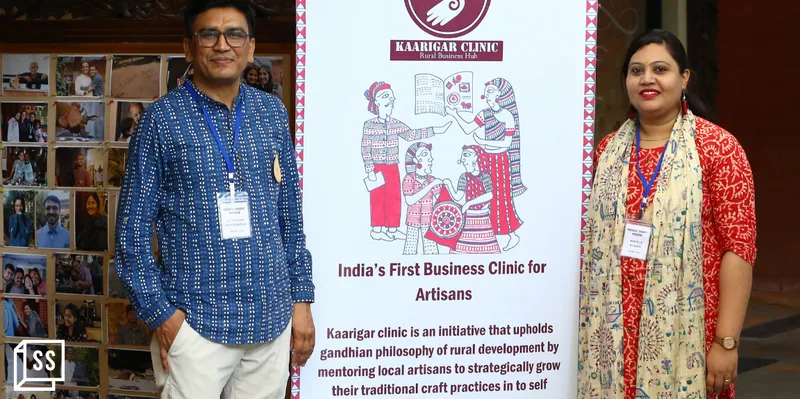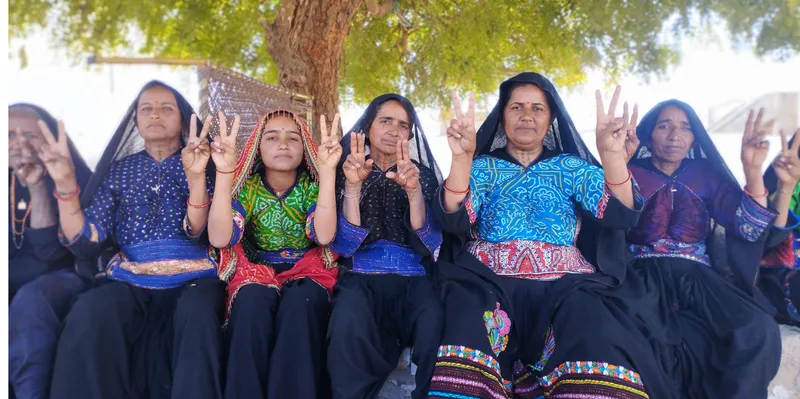How Kaarigar Clinic is creating artisan entrepreneurs by building their brands
Noopur Kumari and Nilesh Priyadarshi started the Kaarigar Clinic in 2019 to give artisans their rightful due by helping them establish their own brand identity.
For her final year project at the National Institute of Technology (NIFT), Noopur Kumari worked on a project that featured a collection for a leading fashion designer in collaboration with traditional kaarigars (artisans) from Kala Raksha, a Gujarat-based NGO that promotes local art.
“We designed a collection of sarees, stoles and dupattas that featured embroidery and art specific to the region. I was very excited about it but when I attended the launch event in Mumbai, I was in for a rude shock. There was no mention of the artisans who had put in all the hard work. All credit was given to the designer,” Kumari tells HerStory.
After completing the project in 2013, she worked for an NGO in Ahmedabad and understood first-hand the difficulties faced by artisans involved in traditional art and craft. Artisans were paid less, they received little or no recognition and it seemed like their work had no value at all.
Later, a stint at Kala Raksha, where she met fellow Co-founder Nilesh Priyadarshi, helped Kumari pursue her passion for helping artists get their rightful due. Together, the duo launched Kaarigar Clinic in 2019.
Today, the organisation is a part of The/Nudge’s latest cohort of social entrepreneurs. And, one of its earliest artisan members—Pabiben Rabari—recently raised Rs 50 lakh on the second season of Shark Tank India.
Kaarigar Clinic’s current cohort comprises 25 artisan entrepreneurs, who in turn, impact 5,000 other artisans. They are involved in art such as applique, ajrakh, textile weaving, pattachitra, plastic weaving, and bandhani.
A marketplace for artisans
Starting their venture as a not-for-profit model, Priyadarshi and Kumar are now developing Kaarigar Clinic as a social enterprise with the organisation's focus on capacity building and building a marketplace for artisans. Kumar looks after the creative side, working directly with artisans while Priyadarshi focuses on the business, networking and administration aspects.
Kaarigar Clinic is also setting into motion a holistic platform for kaarigars.
“Our vision is to create a Kaarigar Ki Dukan (a marketplace for artisans) that will work on a hybrid model. Apart from hosting a physical store, it will work like a Google for artisans,” Priyadarshi said.
According to Priyadarshi, customers looking for products can go to the platform, find a list of artisans, check their profiles and either travel to their physical store or conduct an online transaction. Customers can also search for artisans by location, by craft or by name.
Origin and impact
Kaarigar Clinic’s story began with Priyardarshi and Kumari’s experience while working at Kala Raksha as well as their interactions with the larger artisan community.
When the 2001 earthquake devastated parts of Gujarat, Priyardarshi travelled to its epicentre, Lodai village. He worked with different NGOs on community development and rehabilitation.
“I lived for three years in the village, understood the challenges and also got introduced to the art and craft special to villages in the area,” he says.
Priyardarshi later joined Kala Raksha where he worked for 13 years before switching careers as a business head of Fab India for Gujarat, Rajasthan and Madhya Pradesh. However, despite the experience gained from Kala Raksha and Fab India, Priyadarshi could not help artisans the way he wanted to.

Nilesh Priyadarshi and Noopur Kumari
He enrolled for a PhD from Gujarat Vidyapith, and this research laid the foundation for Kaarigar Clinic. By this time, he had also teamed with Kumari who had shifted to Ahmedabad, and together they started extensive on-field research in Gujarat, Rajasthan, Madhya Pradesh, Odisha, Andhra Pradesh, Karnataka and Tamil Nadu to understand the challenges faced by artisans.
“Eighty percent of the artisans we met were looking for identity, value and recognition for their craft, more than money. They said money can be earned,” says Priyadarshi.
Also, the “faceless market culture” with the buyer and seller unaware of each other affects the artisans’ identity.
During their work at Kala Raksha, the founders came into contact with Pabiben Rabari, an artisan from Bhadroi Village in Anjar, Kutch. A talented kaarigar, she invented a new embroidery art form called Hari Jari.

Pabiben Rabari, second from right, with her community of artisans
“Our idea was to first establish brands with the artisan’s name and develop a business and introduce it in the market so that they got what they needed–money, identity and recognition. For the prototype of Kaarigar Clinic, we decided to go with Rabari, an artisan who had little formal education, few resources and was also a woman artisan,” explains Kumari.
They started working with Rabari on design and skill development, production, and marketing and established pabiben.com, which is now a popular global brand.
“As an artisan doing good work, what was hurting me was that I was not being given the recognition I deserved. Nilesh bhai helped me to set up pabiben as a small business in my village and also include other women in the project. He helped me with marketing and Noopurji helped me with the designs. The three of us run Eye Catching Young Entrepreneurs, a venture in which we are equal partners,” Rabari explained on Shark Tank India.

Rajiben Vankar
After the successful launch of Rabari, Kaarigar Clinic worked with Rajiben Vankar, a women-craft enterprise that weaves upcycled plastic.
Another artisan, Jabbar Khatri comes from a family of ajrakh hand-block printers. But he had to quit his profession due to a lack of income.
After stints at a mobile shop in Mumbai and as a labourer at a tile factory, he returned to his family craft, supported by Kaarigar Clinic.
Today, Jabbar and Mubin (his nephew) are a phenomenal success and also participate in fashion weeks.
Since pabiben.com already had a well-established market and a strong clientele, the founders also created profiles for other artisans on it, to capitalise on its popularity.
“The long-term goal is to impact 1,000 other artisans who will go on to provide livelihoods to others in the ecosystem through different communities, and ultimately we are hoping that 1,000 entrepreneur artisan brands will directly impact one crore people,” he says. It works with a team of 15 that include ‘Kaarigar Doctors’ – fresh management and design graduates who are trained to work on ground with artisans.
Edited by Affirunisa Kankudti







